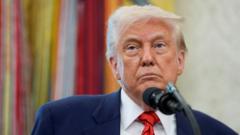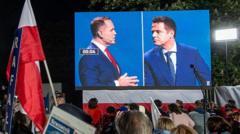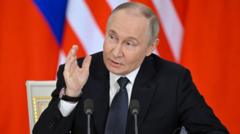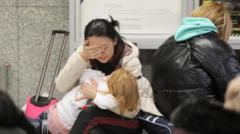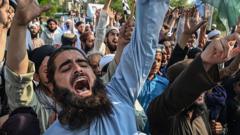Inequalities and political discontent are propelling Romania towards a potentially radical shift in the upcoming presidential election, with far-right candidate George Simion advocating for nationalist policies that could distance the nation from its European alliances.
Romania's Presidential Election: The Nation at a Crossroads

Romania's Presidential Election: The Nation at a Crossroads
As Romania approaches a pivotal election, the prospect of a far-right presidency raises questions about the country's European alignment.
Following the annulment of last year’s presidential election amid allegations of Russian interference, Romania finds itself once more at the polls, facing another critical decision. This time, George Simion—formerly a football casual and now a far-right nationalist—has emerged as a frontrunner against Nicusor Dan, the liberal mayor of Bucharest. The political atmosphere is charged; Simion gained significant momentum after receiving overwhelming support in the first round of voting held earlier this month, which has heightened concerns among many about Romania's potential shift away from the EU.
Voters cast their ballots once again, bearing the weight of a turbulent political history. Reportedly, Simion’s campaign has resonated particularly in poorer regions, with Teleorman County showing a surprising 57% majority for him in the initial round—a drastic change in a locale traditionally loyal to social-democratic politics. As people engage on social media, sentiments are brewing against the existing political structure, leading many to favor the anti-establishment rhetoric Simion espouses.
Amidst this backdrop, local voices like Mihaela from a dairy firm believe in Simion’s promise to prioritize Romanian interests and create jobs. Contrastingly, other voters express anxiety regarding Simion’s foreign relations stance, particularly his questionable positions about military aid to Ukraine and his implications regarding EU connection. This dichotomy reflects the complex realities of Romanian society, where support for radical change collides with commitments to international partnerships.
Dan, advocating for Romania’s integration within European frameworks via collaboration and transparency, expresses a fundamental belief in EU values, promising not to isolate Romania from its partners. He seeks to distinguish himself from Simion, whose incendiary comments have sparked concern over his temperament and leadership suitability. As supporters like Roxana voice their worries regarding international reactions to Simion’s antics, voter mobilization campaigns are activating grassroots initiatives to boost Dan’s visibility and appeal.
As these two candidates vie for control, each election remark carries the potential to shift the political landscape radically. Should Simion prevail, experts predict a volatile political environment ahead, filled with uncertainties especially concerning Romania’s economic future. With his controversial affiliations and proposals, the road post-election promises to be tumultuous at best, enlightening citizens on the reality of their national discourse ahead.
As Romania prepares for the second-round vote, the fundamental choice looms—between a hard-right, nationalistic future or a commitment to traditional European values. What will the outcome mean for the future identity and geopolitical alignment of Romania? Only time will tell.



